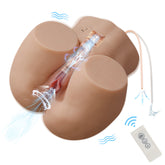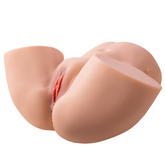Therapeutic effects of sex doll torsos
Robotics is an interdisciplinary field of study and practice that is also relevant to sexuality due to the possibilities of human-computer interaction. The emerging role of sex robots in the context of human-robot interaction has attracted public interest. In the therapeutic debate about sex robots, it is important how psychologists and therapists define robot sex.
The term technosexuality describes sexual activity in connection with technology. There are technical sex acts, such as internet porn, that are more common than other acts in the context of psychology, so far sex with robots has mostly been referred to as objectivism or robot fetish, so this definition is a rather morbid limitation. This is defined as a fetish attraction to humanoid or non-humanoid robots, to people who behave like robots, or to people who wear robot clothing. In the most common and descriptive definition of robot sexuality, it can be defined as the sexual use of robots. This definition includes the use of specialized sex doll torsos and the sexual use of other types of robots that are not specifically designed and sold for sexual purposes.
Discussions surrounding sex robots
Sex robots have sparked professional discussions about robot design, social norms, the place of human-robot sex in relationships, and the potential benefits of sex robots. Therapeutic tools for treating sexual dysfunction. Various types of assistive and therapeutic robots have been used in healthcare applications such as stroke, dementia, autism, or people with physical disabilities.

Robot assistants for healthcare applications can provide users with training and rehabilitation programs that support independent living. Although sex toys are used in sex therapy to treat orgasm problems, there is no information on sex therapists' opinions on sex robots as a sex therapy tool. Robots designed for sex may have different effects than other sex aids. Some sex therapists have come up with a range of problems that robots can help them with, from erectile dysfunction, premature ejaculation and social anxiety to first intercourse.
David Levy comments
In his book Love and Sex with Robots, David Levy expresses a similar sentiment when it comes to the potential psychosocial value of sex robots: "Many would-be social outcasts, social outcasts, children or even worse become more well-adjusted people instead." Levy suggests that if robotic sexual assistance can alleviate the exclusion from solo and partnered sex associated with the disorder, sex doll leg could contribute to health and well-being.
Döring adds that there are also educational and therapeutic sex robots that can carry out certain exercise programs discreetly and without shame or guilt (for example, using safer sex techniques, treating orgasm disorders and preventing transgressions). The statements quoted above are based on preliminary considerations, but no therapists were asked about their attitude towards the benefits of sex robots. We will see what the future brings! Come and try it yourself.









